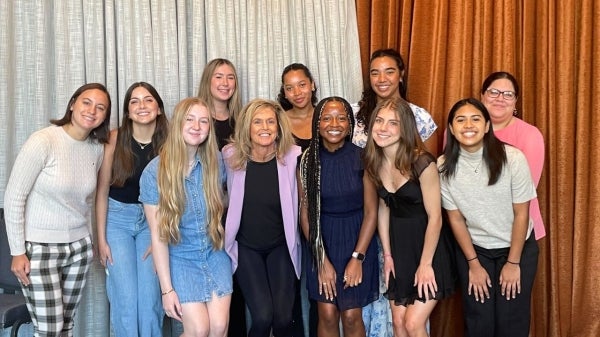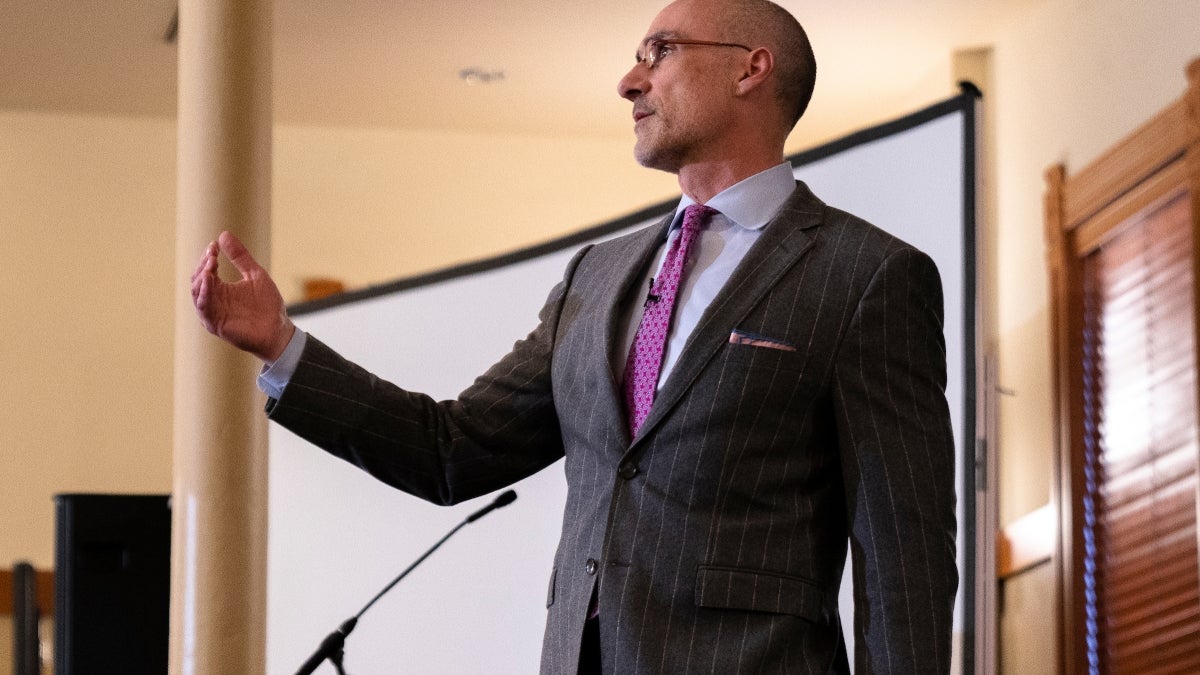Your strengths are your weaknesses. Take more risks. And reach out to the margins of society.
That is how we can bring a deeply divided country back together again.
That was the message of Arthur Brooks — social scientist, musician, contributing opinion writer for The New York Times and the president of the American Enterprise Institute, a conservative think tank — when he spoke Thursday evening at Arizona State University.
Brooks has authored 11 books on topics including the role of government, economic opportunity, happiness and the morality of free enterprise. His latest book is the New York Times bestseller "The Conservative Heart: How to Build a Fairer, Happier, and More Prosperous America."
“You want to bring people together?” Brooks told the crowd at Old Main on the Tempe campus. “Give them more opportunity. ... The question is: How do you do it?”
Brooks — whose talk was part of the “Polarization and Civil Disagreement: Confronting America's Civic Crisis” series, sponsored by the School of Civic and Economic Thought and Leadership, together with the Walter Cronkite School of Journalism and Mass Communication and the Sandra Day O’Connor College of Law — looks at data on poverty and pathways to success.
“That’s what people want: the story of going from the bottom to the middle. ... What do these people have in common? ... If we can do that together, we can come together.”
Brooks embarked on a three-year investigation across the country. “It was the people on the margins of society who gave me the secrets to this.”
Two secrets, to be specific.
He looked at the criminal justice system. Twenty-three million ex-cons are in society.
“These are the most marginalized people in society,” he said. “That’s a disaster for our society.
“I urge you to join me in seeing them as assets, not liabilities.”
He found a prison entrepeneurship program in Houston. Twenty-five convicts are chosen a year before their release. The thinking is if they can become entrepeneurs, they can create their own jobs. Usually, about 50 percent of ex-cons wind up back in prison a year after release. Seven percent of the men who went through the program returned.
Brooks talked to men in the program. They had in mind opening a barbecue joint or a landscaping business, not launching a biotech startup. Program data showed only 16 percent actually opened their own businesses, though. The rest had gotten jobs.
“When they are trained to think like entrepeneurs, they find jobs,” Brooks said. “They didn’t have to start businesses. ... That was the secret I found.”
Brooks called it “treating people with radical equality.”
“That is the secret to the startup life,” he said.
Secret No. 1: Take more risks: “If you conquer your fear, you’re going to be happier.”
Secret No. 2: Use your weakness as a source of strength: “The source of your power is your connection to other people. People are connected by their weaknesses.”
At 30, Brooks earned his bachelor’s degree from a correspondence school, which he hid for years. When he became the head of the American Enterprise Institute, called the most academic think tank in Washington, he was terrified The New York Times or Washington Post would find out (even though his resume clearly stated he was a graduate of Thomas Edison State College in Trenton, New Jersey). AEI was being run by someone who went to a correspondence school. He had been rejected for grad school at Harvard, and here he was hiring Harvard grads.
The fact eventually came to light (through an academic he hired at AEI, not a journalist). He put some thought into his situation.
“If it hadn’t been for that ... I wouldn’t run AEI ... and I wouldn’t be here tonight.”
He wrote a column for the Times about his very cheap — and very valuable — education ($10,000, including books and a bumper sticker he was too scared to put on his car).
“You know my problem? I’m an elitist against myself, which is the worst kind of elitist,” he said. “All of my work should go to people at the margins of society. ... This is how we bring the country together. Reach out to the people on periphery.”
Top photo: Arthur Brooks speaks to a crowd of around 300 people as a part of the "Polarization and Civil Disagreement: Confronting America’s Civic Crisis" series, Thursday evening on the Tempe campus. Photo by Marcus Chormicle/ASU Now
More Law, journalism and politics

Cronkite School launches Women Leaders in Sports Media live-learn program
Women in a new sports media program at Arizona State University got a solid game plan from a sports veteran at an Aug. 20 welcome event.“Be humble, be consistent and be a solver,” Charli Turner…

ASU center to host the Pursuits of Education and Excellence Symposium
The Center for the Study of Race and Democracy (CSRD) at Arizona State University is introducing the Pursuits of Education and Excellence Symposium as part of an ongoing initiative to commemorate the…
ASU journalism students dominate NATAS Student Production Award nominations
Students at Arizona State University’s Walter Cronkite School of Journalism and Mass Communication dominated the nominations field of the prestigious Rocky Mountain Southwest Chapter of the National…
